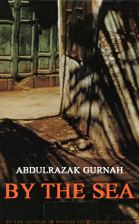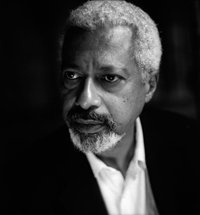Trans-Scriptions
writing . culture . location
Abdulrazak Gurnah
By the Sea
 By the Sea tells of an elderly man coming to Britain from Zanzibar, off the coast of Tanzania, as an asylum seeker. Rajab Shaaban--the name on his passport--does not explain to the British immigration authorities why he needs asylum, expecting only to be accepted, as the government of Zanzibar has been officially designated "as dangerous to its own citizens". The picture Gurnah paints of the asylum-seeker's lot in late 20th-century Britain is not a favourable one. Shaaban comes to Britain claiming he cannot speak English, yet understands all that is said to him. Through this deception he meets, after 30 years, the son of his namesake; Latif Mahmud has settled in Britain and is presented as an academic expert who will speak Rajab's language. We also receive glimpses of the torture and imprisonment of Shaaban in his own country, where men abuse their power after independence from colonialism. However, this unfair treatment is marginalised by the deception, bitterness and revenge that reverberates between the two families of Gurnah's story.
By the Sea tells of an elderly man coming to Britain from Zanzibar, off the coast of Tanzania, as an asylum seeker. Rajab Shaaban--the name on his passport--does not explain to the British immigration authorities why he needs asylum, expecting only to be accepted, as the government of Zanzibar has been officially designated "as dangerous to its own citizens". The picture Gurnah paints of the asylum-seeker's lot in late 20th-century Britain is not a favourable one. Shaaban comes to Britain claiming he cannot speak English, yet understands all that is said to him. Through this deception he meets, after 30 years, the son of his namesake; Latif Mahmud has settled in Britain and is presented as an academic expert who will speak Rajab's language. We also receive glimpses of the torture and imprisonment of Shaaban in his own country, where men abuse their power after independence from colonialism. However, this unfair treatment is marginalised by the deception, bitterness and revenge that reverberates between the two families of Gurnah's story.
By the Sea does not present the reader with sympathetic characters and the tales that are woven are often confusing and petty. Mahmud and Shaaban take it in turns to tell their side of the story, almost drenching the reader with too much detail. Notably, Gurnah always makes his characters point out that they do not tell each other the whole truth; they leave gaps as if to protect each other and their families. Unfortunately, this makes the narrative distant and incomplete. It is hard to appreciate the stories and lives being unravelled when the narrators themselves seem unlikeable and distrustful. However, this may merely be a reflection of the bitterness and deprivation suffered in post-colonial Zanzibar, and the desolation that refugees find when away from their birth land.
review from Amazon.co.uk
 Novelist Abdulrazak Gurnah was born in 1948 on the island of Zanzibar off the coast of East Africa. He came to Britain as a student in 1968 and now teaches literature at the University of Kent. He is associate editor of the journal Wasafiri.
Novelist Abdulrazak Gurnah was born in 1948 on the island of Zanzibar off the coast of East Africa. He came to Britain as a student in 1968 and now teaches literature at the University of Kent. He is associate editor of the journal Wasafiri.
His first three novels, Memory of Departure (1987), Pilgrims Way (1988) and Dottie (1990), document the immigrant experience in contemporary Britain from different perspectives. His fourth novel, Paradise (1994), is set in colonial East Africa during the First World War and was shortlisted for the Booker Prize for Fiction. Admiring Silence (1996) tells the story of a young man who leaves Zanzibar and emigrates to England where he marries and becomes a teacher. A return visit to his native country 20 years later profoundly affects his attitude towards both himself and his marriage. By the Sea (2001), is narrated by Saleh Omar, an elderly asylum-seeker living in an English seaside town.
Abdulrazak Gurnah lives in Brighton, East Sussex. His most recent novel is Desertion (2005), shortlisted for a 2006 Commonwealth Writers Prize.
bio from contemporary writers.com

Centre for Transcultural Writing and Research, County College, Lancaster University, LA1 4YD, UK